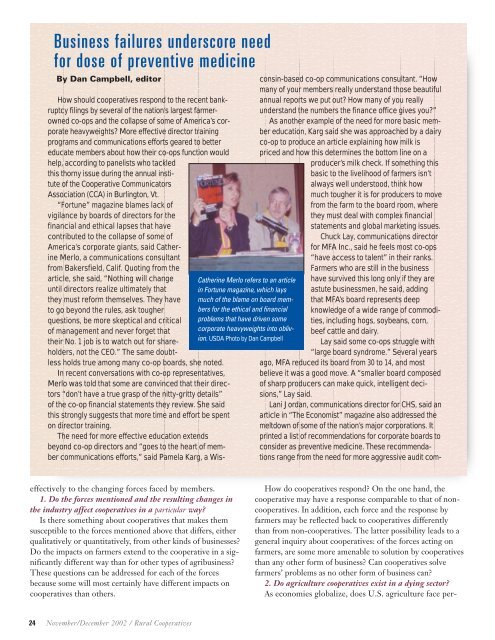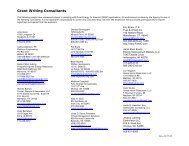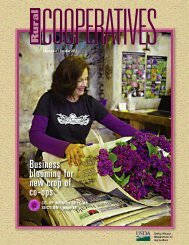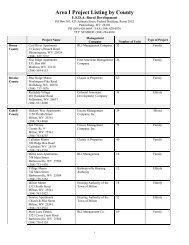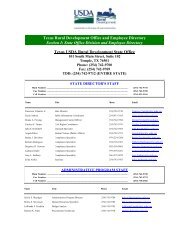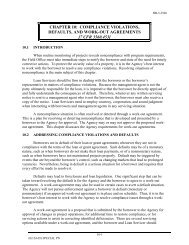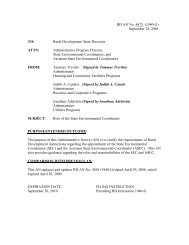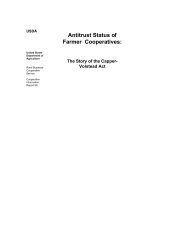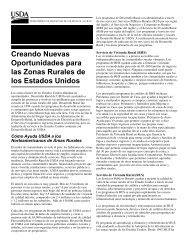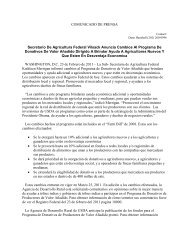1031924 Rur Coop-Nov/Dec 02 - USDA Rural Development - US ...
1031924 Rur Coop-Nov/Dec 02 - USDA Rural Development - US ...
1031924 Rur Coop-Nov/Dec 02 - USDA Rural Development - US ...
You also want an ePaper? Increase the reach of your titles
YUMPU automatically turns print PDFs into web optimized ePapers that Google loves.
Business failures underscore need<br />
for dose of preventive medicine<br />
By Dan Campbell, editor<br />
How should cooperatives respond to the recent bankruptcy<br />
filings by several of the nation’s largest farmerowned<br />
co-ops and the collapse of some of America’s corporate<br />
heavyweights? More effective director training<br />
programs and communications efforts geared to better<br />
educate members about how their co-ops function would<br />
help, according to panelists who tackled<br />
this thorny issue during the annual institute<br />
of the <strong>Coop</strong>erative Communicators<br />
Association (CCA) in Burlington, Vt.<br />
“Fortune” magazine blames lack of<br />
vigilance by boards of directors for the<br />
financial and ethical lapses that have<br />
contributed to the collapse of some of<br />
America’s corporate giants, said Catherine<br />
Merlo, a communications consultant<br />
from Bakersfield, Calif. Quoting from the<br />
article, she said, “Nothing will change<br />
until directors realize ultimately that<br />
they must reform themselves. They have<br />
to go beyond the rules, ask tougher<br />
questions, be more skeptical and critical<br />
of management and never forget that<br />
their No. 1 job is to watch out for shareholders,<br />
not the CEO.” The same doubtless<br />
holds true among many co-op boards, she noted.<br />
In recent conversations with co-op representatives,<br />
Merlo was told that some are convinced that their directors<br />
“don’t have a true grasp of the nitty-gritty details”<br />
of the co-op financial statements they review. She said<br />
this strongly suggests that more time and effort be spent<br />
on director training.<br />
The need for more effective education extends<br />
beyond co-op directors and “goes to the heart of member<br />
communications efforts,” said Pamela Karg, a Wis-<br />
effectively to the changing forces faced by members.<br />
1. Do the forces mentioned and the resulting changes in<br />
the industry affect cooperatives in a particular way?<br />
Is there something about cooperatives that makes them<br />
susceptible to the forces mentioned above that differs, either<br />
qualitatively or quantitatively, from other kinds of businesses?<br />
Do the impacts on farmers extend to the cooperative in a significantly<br />
different way than for other types of agribusiness?<br />
These questions can be addressed for each of the forces<br />
because some will most certainly have different impacts on<br />
cooperatives than others.<br />
24 <strong>Nov</strong>ember/<strong>Dec</strong>ember 20<strong>02</strong> / <strong>Rur</strong>al <strong>Coop</strong>eratives<br />
Catherine Merlo refers to an article<br />
in Fortune magazine, which lays<br />
much of the blame on board members<br />
for the ethical and financial<br />
problems that have driven some<br />
corporate heavyweights into oblivion.<br />
<strong><strong>US</strong>DA</strong> Photo by Dan Campbell<br />
consin-based co-op communications consultant. “How<br />
many of your members really understand those beautiful<br />
annual reports we put out? How many of you really<br />
understand the numbers the finance office gives you?”<br />
As another example of the need for more basic member<br />
education, Karg said she was approached by a dairy<br />
co-op to produce an article explaining how milk is<br />
priced and how this determines the bottom line on a<br />
producer’s milk check. If something this<br />
basic to the livelihood of farmers isn’t<br />
always well understood, think how<br />
much tougher it is for producers to move<br />
from the farm to the board room, where<br />
they must deal with complex financial<br />
statements and global marketing issues.<br />
Chuck Lay, communications director<br />
for MFA Inc., said he feels most co-ops<br />
“have access to talent” in their ranks.<br />
Farmers who are still in the business<br />
have survived this long only if they are<br />
astute businessmen, he said, adding<br />
that MFA’s board represents deep<br />
knowledge of a wide range of commodities,<br />
including hogs, soybeans, corn,<br />
beef cattle and dairy.<br />
Lay said some co-ops struggle with<br />
“large board syndrome.” Several years<br />
ago, MFA reduced its board from 30 to 14, and most<br />
believe it was a good move. A “smaller board composed<br />
of sharp producers can make quick, intelligent decisions,”<br />
Lay said.<br />
Lani Jordan, communications director for CHS, said an<br />
article in “The Economist” magazine also addressed the<br />
meltdown of some of the nation’s major corporations. It<br />
printed a list of recommendations for corporate boards to<br />
consider as preventive medicine. These recommendations<br />
range from the need for more aggressive audit com-<br />
How do cooperatives respond? On the one hand, the<br />
cooperative may have a response comparable to that of noncooperatives.<br />
In addition, each force and the response by<br />
farmers may be reflected back to cooperatives differently<br />
than from non-cooperatives. The latter possibility leads to a<br />
general inquiry about cooperatives: of the forces acting on<br />
farmers, are some more amenable to solution by cooperatives<br />
than any other form of business? Can cooperatives solve<br />
farmers’ problems as no other form of business can?<br />
2. Do agriculture cooperatives exist in a dying sector?<br />
As economies globalize, does U.S. agriculture face per-


